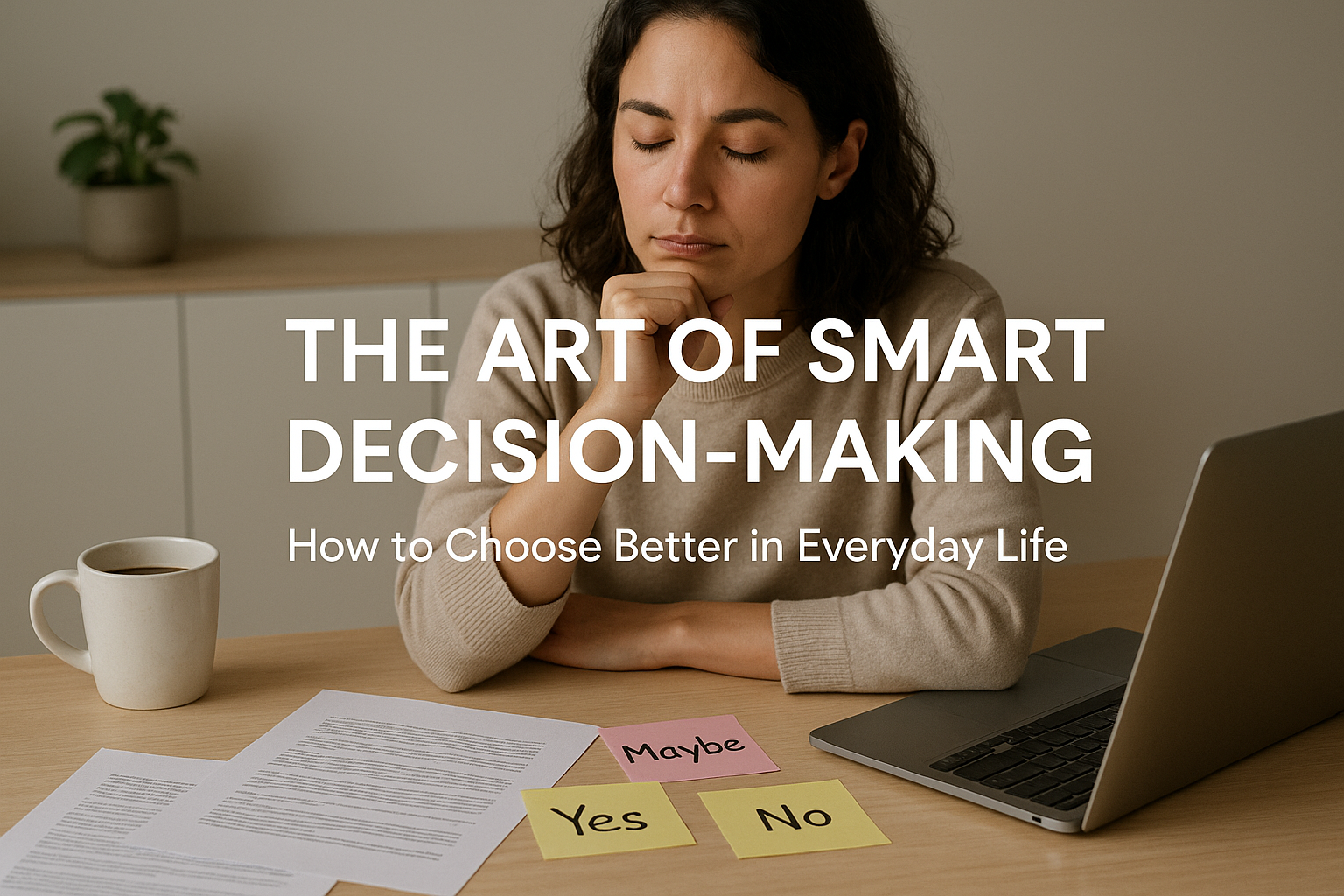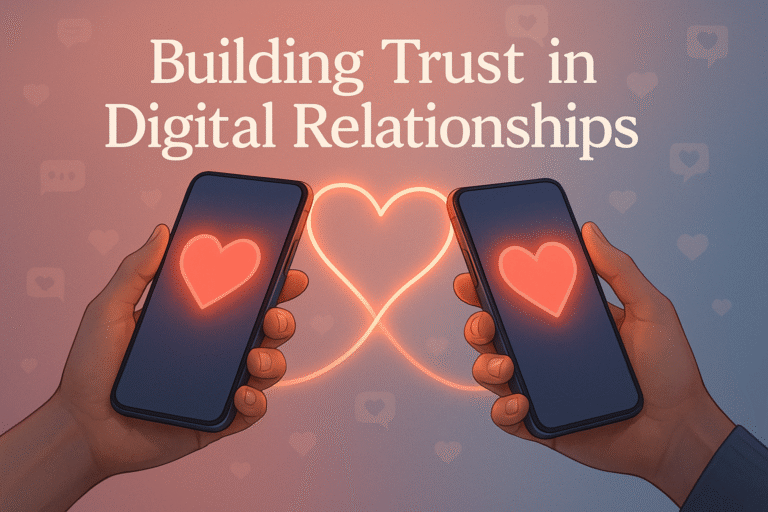
In a world full of options — from the phone you buy to the coffee you drink — making the right decision can feel overwhelming. Yet, the ability to make smart choices is what shapes success, happiness, and peace of mind. Whether it’s choosing a product, career, or even a relationship, mastering the art of decision-making helps you lead a more confident and balanced life.
Why Smart Decision-Making Matters
Every decision you take creates a ripple effect. Good decisions move you closer to your goals, while poor ones can slow progress or cause regret. Decision-making isn’t about luck — it’s about logic, awareness, and emotional intelligence. By understanding how your mind works, you can minimize bias and maximize clarity.
1. Understand the Psychology Behind Choices
Research in behavioral economics shows that humans don’t always make rational decisions. We are influenced by emotions, social pressure, and past experiences. For instance, we might pick a product just because our favorite influencer recommended it — even if it’s not the best fit. The first step toward smarter choices is recognizing these biases.
- Confirmation bias: Seeking information that supports what you already believe.
- Anchoring bias: Depending too heavily on the first piece of information you receive.
- Choice overload: Feeling paralyzed when too many options exist.
2. Simplify the Process — Don’t Overthink
Sometimes, over-analyzing leads to confusion. Instead, use the “3C Rule”: Compare, Consider, and Commit.
- Compare: Shortlist 2–3 best options.
- Consider: Evaluate pros and cons logically.
- Commit: Make the decision and move forward confidently.
3. Use Data and Logic for Important Decisions
When the decision involves money, time, or reputation — rely on data. Create a simple decision matrix or scorecard. Assign ratings from 1–10 based on factors like cost, reliability, and convenience. This reduces emotional influence and reveals the objectively best choice.
| Option | Cost | Quality | Ease of Use | Total Score |
|---|---|---|---|---|
| Option A | 8 | 9 | 7 | 24 |
| Option B | 7 | 8 | 9 | 24 |
| Option C | 6 | 9 | 8 | 23 |
4. Balance Logic with Intuition
Not all decisions can be data-driven. Sometimes your gut feeling knows the right direction. Intuition is simply experience turned into instinct. If something feels wrong even after research, pause and re-evaluate — your subconscious might be warning you of unseen risks.
5. Avoid Decision Fatigue
Every decision, big or small, consumes mental energy. By evening, your brain gets tired, making you more likely to take shortcuts or make impulsive choices. Reduce unnecessary decisions by creating routines — wear the same style of clothes, plan meals in advance, and automate small tasks. Save your energy for what truly matters.
6. Seek Trusted Reviews and Expert Opinions
One of the best ways to decide smartly is by learning from others. Before buying or subscribing, read authentic reviews, compare multiple sources, and verify credibility. Websites like ReviewAnyOption.com exist for exactly this purpose — to help you make confident, well-researched choices without confusion.
7. Learn from Past Decisions
Every choice teaches a lesson. Reflect on previous decisions — what worked, what failed, and why. Keeping a simple “decision diary” helps spot patterns in your thought process and improves future choices. Over time, you’ll become more self-aware and confident.
8. The Power of Patience and Timing
Sometimes the smartest choice is to wait. Acting too soon can lead to regret, while waiting too long can mean missed opportunities. The key is knowing when you have enough information to decide. Once clarity arrives — don’t hesitate.
9. The Role of Technology in Decision-Making
Today, AI tools, comparison engines, and data-driven apps assist in analyzing reviews, features, and prices. From choosing insurance to picking a smartphone, technology empowers better decisions. But always remember — these tools should guide, not replace, human judgment.
10. Decision-Making in Relationships and Career
While products and services come with manuals, life doesn’t. Choosing the right partner or career requires self-understanding. Ask questions like:
- Does this align with my long-term goals?
- Am I doing this out of fear or passion?
- Will this add genuine value to my life?
11. The Ripple Effect of Micro-Decisions
Small daily decisions — waking up early, reading instead of scrolling, saving instead of spending — shape the person you become. Smart decision-making isn’t one big moment, it’s a series of consistent, conscious actions that build a meaningful life.
12. How to Build Decision Confidence
Indecision often comes from fear of failure. Remember, no decision is 100% perfect. Confidence grows when you act, learn, and adapt. A simple rule: if you can recover from the worst-case scenario, the decision is safe to take.
13. Common Myths About Decision-Making
- Myth 1: There’s always one perfect choice — Reality: multiple paths can be right.
- Myth 2: Smart people don’t make mistakes — Reality: they just recover faster.
- Myth 3: Data beats emotions — Reality: balance between both is ideal.
14. Decision-Making Frameworks You Can Try
Some proven techniques include:
- SWOT Analysis: Strengths, Weaknesses, Opportunities, Threats.
- Pros-Cons Table: A simple visual way to weigh outcomes.
- 80/20 Rule: Focus on 20% of factors that bring 80% of results.
- First Principles Thinking: Break down assumptions and rebuild logic from scratch.
15. Final Thoughts
Smart decision-making is a lifelong skill — part science, part art. The more consciously you choose, the more control you gain over your life’s direction. From small daily habits to life-changing moments, every choice counts. Remember — the goal isn’t to be perfect, but to be aware.
FAQs
1. Can decision-making be learned?
Absolutely. By studying patterns, understanding biases, and practicing logical thinking, anyone can become a better decision-maker.
2. How do I handle regret after a bad decision?
Focus on the lessons, not the loss. Every wrong choice teaches you what to avoid next time.
3. Are emotional decisions always bad?
No. Emotions add empathy and personal meaning — the key is to keep them balanced with logic.
4. How do I make decisions faster?
Set a deadline, use structured frameworks, and trust your preparation. Overthinking often wastes time.
5. What’s the biggest mistake in decision-making?
Ignoring facts and following assumptions blindly. Always verify before committing.



